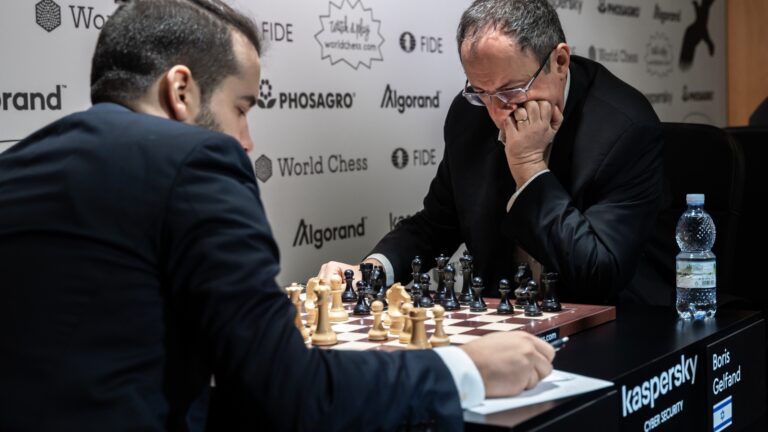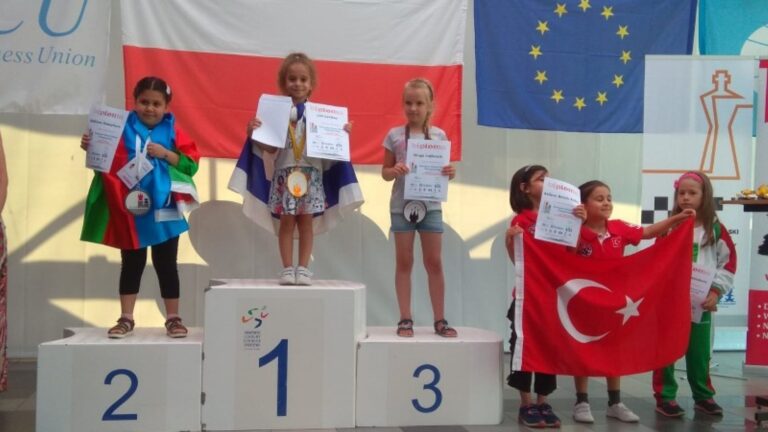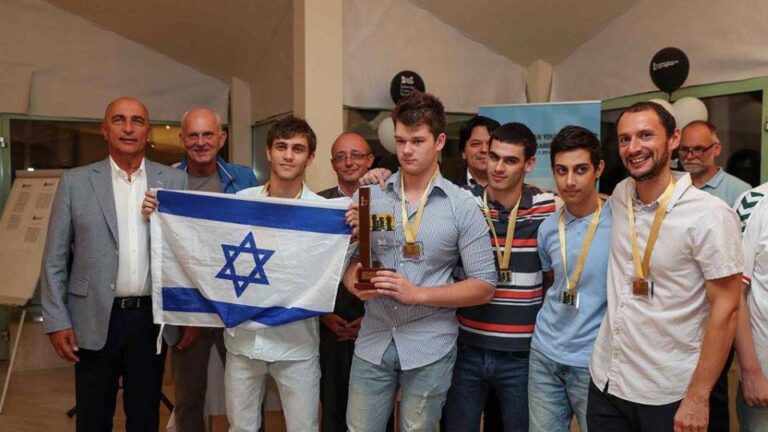A sleepy southern Israeli city that is passionate about the game of chess has had the honor of hosting the World Team Championships of the game of kings.
The world’s top players – who traveled last week from as far away as China and Cuba – sat at their numbered, blue-draped tables utterly focused on their games as the 10-day tournament got underway.
To those who follow chess in Israel, it came as no surprise that the competition was hosted in a relatively modest Beersheva community center rather than in a more luxurious location in Tel Aviv or Jerusalem. The Negev city is considered the nation’s – and one of the world’s – chess strongholds.
Beersheva has a higher percentage of grandmasters per capita – eight – than any other city worldwide, the majority of them immigrants from the former Soviet Union; the city of 183,000 has one grand master per 22,875 residents.
Hundreds of local fans of the game came to the tournament excited to see the best in the world play came to watch the players contemplate their boards. Murmuring in Hebrew and Russian filled the room as the players made their moves.
“We have high hopes for the Israeli team,” Israel Chess Federation president Aviv Bushinsky told ISRAEL21c. “Unfortunately, in chess, being the home team doesn’t really give you an advantage. Your hometown crowd can’t cheer you on because spectators at chess tournaments are required to be silent.”
The competition included the top chess teams in the world: Russia, naturally – who are favored to win – as well as Ukraine, Armenia, the US, Cuba, the Republic of Georgia and China, and of course, Israel, which ranks fifth in the world. The nine rounds of play involve four players from each team.
With a long list of corporate and organizational sponsors, the event was a cooperative effort between the Beersheva Municipality and the Israel Chess Federation, headed by Bushinsky.
“We had to convince the international chess federation that you are capable and qualified to have the chess championships – that we were able to provide all of the necessary professional equipment – you need special chessboards that are attached to computers so the games can be watched live on the Internet,” Bushinsky said.
Because chess is not generously funded by the Israeli government the federation had to get creative. He said that the city of Beersheva was extremely generous and did an excellent job organizing the venue.
“The way they arranged the tournament hall was magnificent especially considering Israel is not experienced in such events and to see that the municipality did such a marvelous job was really great,” he said.
Bushinsky is a familiar face to Israelis – he served as a longtime spokesman to former Prime Minister Binyamin Netanyahu and is known has his most trusted aide, but few knew of his affinity for chess until the tournament.
“I started playing when I was four and competed when I was five, so I’m not 60 years old but I have the experience of one. I played in tournaments, and quit competing when I was 16, but I kept on watching it playing, loving the game and I follow it. Taking this volunteer position as president gives me a chance to promote something I love.”
There are jokes made about his chess skills coming into play when it comes to politics, though he says politics “are a different game altogether.”
Still, among the players was a national leader as skilled as politics as he is at chess – Armenian Defense Minister Serzh Sarkisian, leading his country’s team.
Beersheva, Sarkisian confirms, is “indeed the capital of chess in Israel.”
Bushinsky credits legendary club manager Eliahu Levant for that accomplishment. Under his leadership, the city’s club has won national titles year after year – 15 Israeli national championships all told, the world championship for senior citizens, and numerous national and international youth titles. Two members of the Israeli team this week hail from Beersheva and the Israeli national chess title been captured by Beersheva residents four times.
During the tournament, Levant is being awarded by Ben-Gurion University of the Negev for the tremendous effort he’s put into the game and helping to put the region on the map.
Inspired by Zionism, Levant was able to leave Leningrad in 1972 and he headed for Beersheva. He recounted to the Times of London what happened when his family arrived at the Russian airport with only $400 and a few bags. Inside his suitcases were 30 chessboards with which he could renew his career in Israel – if he could get them past the strict Soviet customs agents.
“The first Customs inspector wanted to throw (the boards) away because he thought I would sell them,” Levant told the British newspaper. “But the other one was a Leningrad player whom I had trained. I didn’t recognize him but he remembered me and said, ‘Let them go, he’s a professional’.”
When Levant arrived, he aggressively recruited the top players from local schools in the region, laying the foundations for his chess dynasty, which has spawned nearly 40 local chess teams, with programs for children beginning as young as age four. His status is reflected in the name of the building that houses the club – the Eliahu Levant Chess Center.
The goal that Levant and Bushinsky are working towards – dominance in the sport by Israelis -was envisioned by none other than the country’s first prime minister David Ben-Gurion himself.
“Ben-Gurion’s vision to establish chess in Israel came after our soccer national team was beaten by the Poles. He said let’s invest in something we are good at,” said Bushinksy.
Politics played a part in the tournament. The organizers were disappointed that what would have been representation from an Arab country – Egypt had been chosen to represent the continent – fell victim to politics. Egypt cancelled its participation, a move that was dubbed political by the Israel Chess Federation.
President Moshe Katsav who spoke at the tournament’s opening ceremony, criticized the Egyptian team for boycotting the tournament, saying that they had “transformed the sport into a weapon.”
Bushinsky noted, however, that to counter the bad news from the Egyptians was the achievement of the Malaysian referee who came to participate in the competition.
“We had a long conversation on the first day of the tournament and he was really excited that he was here in Israel and wanted to do sightseeing and plans to formally invite the Israeli national team to play there if officials there will allow it.” Bushinksky said.
For the first time in the history of the tournament, women participated. A new rule by the international body to invite the top women’s team in the world to compete brought the Chinese women’s team to Beersheva – a group that included an 11 year old girl.
Bushinsky says that he is happy the tournament has received a great deal of attention and publicity within Israel, and hopes that the increased awareness will make it more attractive to those who are younger and native born as well as older immigrant crowd – and inspire the government to support it as they do in eastern Europe.
He still believes in Ben-Gurion’s vision of Israeli potential to dominate the world scene – despite the fact that the game requires a lot of patience, which Israelis aren’t known for.
“Don’t forget he said, we also have chutzpah, which definitely comes in handy when you are playing a tough game of chess.”















